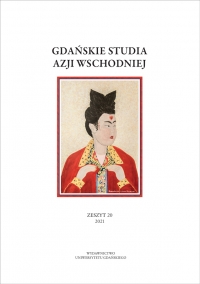Podstawowe aspekty wykładni prawa w chińskim porządku prawnym
Abstrakt
Chinese legal culture was shaped in a different way than Western legal culture, these differences have a significant impact on the rule of law, fundamental rights and democracy in contemporary China. Legal interpretation is one of the formal sources of law in China. The authority to interpret legislation is usually characterized as a legislative rather than a judicial function. The Standing Committee of the National People’s Congress (NPC), the State Council and the Supreme People’s Court have a special role in interpretive activities. Chinese legal interpretation includes semantic rules, the cultural and linguistic context of law, basic constitutional principles, the hierarchy of sources of law and reasoning by analogy.
Downloads
Bibliografia
Barak A., Purposive Interpretation in Law, Princeton 2005.
Cao D., Chinese Language in Law: Code Red, London 2018.
Cao D., Chinese Law: A Language Perspective, New York 2014.
Cao D., Dillemas in Translating Legal Terms between Chinese and English [w:] Legal Translation: Current Issues and Challenges in Research, Methods and Applications, eds. I. Simonnæs, M. Kristiansen, Berlin 2019.
Cao D., Key Word in Chinese Law [w:] Images in Law, eds. A. Wagner, W. Pencak, Burlington 2006.
Hong Kong’s Constitutional Debate: Conflict Over Interpretation, eds. J.M.M. Chan, H.L. Fu, Y. Ghai, Hong Kong 2000.
Chauvin T., Stawecki T., Winczorek P., Wstęp do prawoznawstwa, Warszawa 2014.
Chen J., Chinese Law: Context and Transformation, Leiden – Boston 2008.
Constant F., Circulation of Law and Jurisprudence of Korea and China: Homicide and the Notion of Requital of Life [w:] The Spirit of Korean Law: Korean Legal History in Context, ed. M. Kim, Leiden 2015.
Fu Y., The Chinese Supreme People’s Court in Transition [w:] Supreme Courts in Transition in China and the West Adjudication at the Service of Public Goals, eds. C.H. van Rhee, Y. Fu, Cham – Switzerland 2017.
HKU Legal Scholarship Blog, http://researchblog.law.hku.hk/2017/07/guide-to-legislative-interpretation-in.html (dostęp: 1.06.2021).
Leyh G., Toward a Constitutional Hermeneutics, „American Journal of Political Science” 1988, vol. 32(2).
Lin F., Idealism and Realism in Chinese Constitutional [w:] Constitutionalism and the Rule of Law: Bridging Idealism and Realism, eds. M. Adams, A. Meuwese, E.H. Ballin, Cambridge 2017.
Lin Y., Constitutional evolution through legislation: The quiet transformation of China’s Constitution, „International Journal of Constitutional Law” 2015, vol. 13(1).
Lin Y., My Country and My People, London 1936, https://archive.org/details/MyCountryAnd- MyPeople1936 (dostęp: 5.06.2021).
Lubman S., Introduction: The Future of Chinese Law, „The China Quarterly” 1995, no. 1.
Mo J., Zhai G., Continuous Growth in Reform and Opening-up: Three Decades of Development of Constitutional Law Studies in China [w:] Constitutional Development in China, 1982–2012, eds. L. Li, J. Mo, G. Zhai, Singapur 2020.
Nisbett R., Geografia myślenia. Dlaczego ludzie Wschodu i Zachodu myślą inaczej, tłum. E. Wojtych, Sopot 2003.
Ross C., Ross L., Sources of Systemic Vagueness and Ambiguous Authority in Chinese Statutory Language [w:] The Limits of the Rule of Law in China, eds. K.G. Turner, J.V. Feinerman, R.K. Guy, Washington 2000.
Rowiński J., Jakóbiec W., System konstytucyjny Chińskiej Republiki Ludowej, Warszawa 2006.
Sikora S., Dialog o białym koniu (Bai Ma Lun) – metodologiczne problemy badań porównawczych logiki chińskiej i zachodniej, „Investigationes Linguisticae” 2006, vol. 14.
Stępień M., Spór konfucjanistów z legistami: w kręgu chińskiej kultury prawnej, Kraków 2013.
Szpotakowski I., Złota era w historii Chin – panowanie cesarza Taizonga z dynastii Tang [w:] Monarchia: idea, historia, perspektywy, eds. K. Kofin, M. Kofin, Kraków 2018.
Wei L., Judicial Interpretation in China, „Willamette Journal of International Law and Dispute Resolution” 1997, vol. 5, no. 1.
Yu X., Legal Pragmatism in the People’s Republic of China, „Cornell Law Faculty Publications” 1989, http://scholarship.law.cornell.edu/facpub/993 (dostęp: 31.05.2021).
Zhang J., The Tradition and Modern Transition of Chinese Law, Berlin – Heidelberg 2014.
Zhang L., Prawo porównawcze w Chinach, „Forum Prawnicze” 2014, nr 5(25).

 Uniwersyteckie Czasopisma Naukowe
Uniwersyteckie Czasopisma Naukowe





